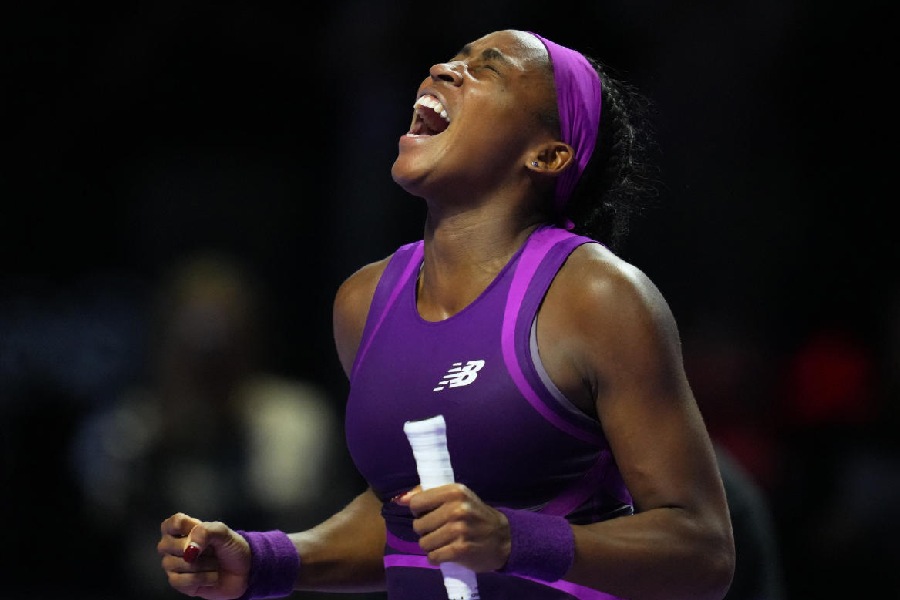The sellout crowd was bathed in purple light and the screens ringing the stadium flashed a countdown to a clubby beat. The latest conquest in Saudi Arabia’s unstoppable advance into the world of sports — football, golf, boxing, car racing, now tennis — was about to begin. The Women’s Tennis Association Finals had come to Riyadh.
For one night, the capital of an authoritarian, conservative kingdom where progress on women’s rights is still stop-and-go was about to be home to one of the most prestigious events in women’s tennis.
“Change the game,” an announcer intoned just before the players in the singles final, Coco Gauff of the US and Zheng Qinwen of China, emerged onto the court to huge cheers from the crowd, which included many Saudi women. “Redefine power.”
In another place, those words might have come off as little more than a girl-power slogan for women’s sports. But in Saudi Arabia on Saturday night, it was the host country redefining who held power in women’s tennis and beyond.
For years now, Crown Prince Mohammed bin Salman, the country’s de facto ruler, has used Saudi oil
riches to remake his staid kingdom into a global player with glitz to match, pairing tectonic social changes with intensifying repression.
Sports are a major part of his transformational push. Saudi Arabia muscled into professional golf by pouring $2 billion into an upstart competitor to the PGA Tour, which disdained the Saudi league before eventually deciding to partner with it. The country burst onto the international football scene by purchasing the English Premier League team Newcastle United, luring some of the biggest names in the sport to the Saudi Pro League and winning a bid to host the 2034 World Cup.
Moving into tennis, Saudi Arabia recently hosted the Six Kings Slam, an exhibition showcasing the top men’s players. And it struck a three-year deal with the financially struggling WTA to bring its finals to Riyadh in part with the
promise of awarding some $15 million in prize money this year. Those are the highest winnings in the history of women’s tennis, satisfying players’ demands for prize parity with men.
More professional tennis events are likely to follow.
With every move has come controversy over the kingdom’s human rights record. But on Saturday night, the power of what Saudi Arabia has bought itself — and the excitement the changes are generating at home — was there for all to see.
As the players began warming up, the DJ played the Bob Marley song No Woman No Cry as people in the audience sang along. Gauff and Zheng went on to battle it out for three hours. The Chinese fans whooped for Zheng, but hijab-wearing young Saudi women would not be drowned out, chanting, “Let’s go, Coco, you can do this!”
Gauff had publicly weighed the pros and cons of playing in Saudi Arabia in remarks before arriving there, saying that she looked forward to promoting the sport in a new place while expressing reservations about the country’s record on LGBTQ+ and women’s rights. But she stuck to the positive in a news conference after winning the final, declaring the event a success that would inspire young Saudis.
“Just to show young girls that, you know, their dreams are possible, I’m literally no different than they are. We just maybe come from different places,” Gauff said.
Saudi girls had not had the chance to watch professional tennis events in their own country, the way she had done when she was young, she added. But now that
had changed.
By the time she retired, she said, she hoped there would be a Saudi Grand Slam champion.
Some women’s tennis players and officials have embraced the chance to boost the sport in a new country (and bring in revenue aplenty from a host with means). Others, including a few of the sport’s biggest stars, have criticised the WTA’s decision on human rights grounds.
“We lost our moral high ground when the women decided to go there,” Martina Navratilova told The New York Times in October. “You have to show me some progress
first. Women have to be equal citizens under the law. Otherwise, we might as well play in North Korea.”
Saudi women are driving, entering the workforce and moving out on their own in record numbers after changes put in place by Crown Prince Mohammed. But they still need the permission of a male guardian to marry.
Homosexuality remains criminalised, something that has come under particular fire in a sport with a groundbreaking history of openly LGBTQ+ champions. (Even so, Billie Jean King, an icon in tennis not only for her on-court accomplishments but also for her gay rights advocacy, has endorsed the WTA’s choice of location, arguing that engaging is the only way to effect change.)
And the kingdom’s image still bears the taint of the gruesome killing in 2018 of Jamal Khashoggi, a Washington Post columnist who occasionally criticised the Saudi government, which US intelligence agencies later concluded had been ordered by Crown Prince Mohammed. That was only the best-known instance of the crown prince’s sweeping crackdown against critics and political opponents, which has sent hundreds of Saudis, including prominent women’s rights activists, to prison in recent years.
The dark side of the transformation has led many critics to accuse the kingdom of “sportswashing,” paying to associate itself with high-profile athletes and popular events to distract from its rights record. The Saudi government has rejected such allegations.
But many Saudis, especially young ones, are thrilled that new options for work, for fun, for mingling with the opposite sex, for wearing what they want and so much more are opening up at a pace that would have been impossible just a decade ago.
First came theatres and concerts, shattering the once-sleepy kingdom’s decades-old religiously motivated bans on most forms of entertainment. Then came raves in the desert, marquee boxing matches and, now, tennis matches.
“The Western world can keep reporting that our country is sportswashing, or whatever, but what matters is that my sisters and I can watch our favorite sports stars right here at home,” said Maryam al-Shammeri, who was in the crowd for the WTA final on Saturday night with her brother and two sisters.
Unlike many women in liberalising Riyadh where many now go unveiled or wear loose abayas over T-shirts and jeans, the sisters had stuck to wearing conservative black niqabs to the match. To al-Shammeri, there was no contradiction between their decision not to show skin and their embrace of women’s tennis. “What we define as feminist is not determined by what we wear in public,” she said.
New York Times News Service










